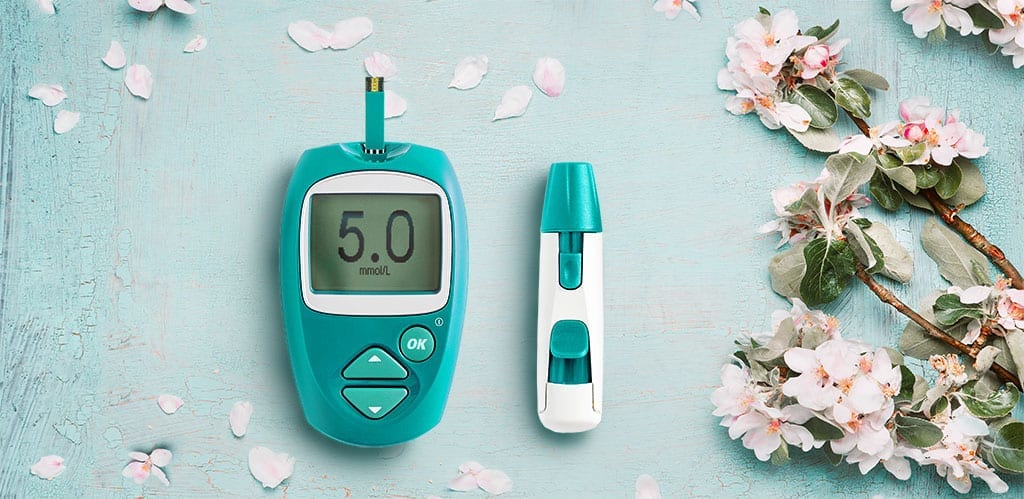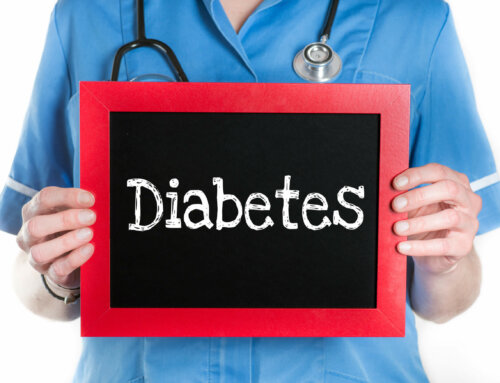It is already springtime and no great strides have been made in healthcare in the past year. Health care options have been stagnant and are becoming even more limited, with out of pocket expenses, co-pays, deductibles, drug plans and out of network costs skyrocketing. Diabetes continues to be the 7th leading cause of death in the US, with over 30 million adults still living with diabetes. Diabetes, is a chronic disease which may cause minor, internal changes to your bodies daily, but when blood sugars are not controlled for an extended time, diabetes can lead to an array of added complications effecting the eyes, kidneys, nerves, feet, vascular system and heart.
The best way to avoid diabetes complications is to take responsibility and take charge of what you can, along with help from your health care team. Read on to explore a list of ways you can help keep your blood sugars where you want them this spring.
Getting Enough ZZZ’s
Not sleeping enough or having inadequate quality of sleep is a quick way to poor health and higher blood sugar readings. Below average sleep can lead to an elevated A1C, higher blood pressure readings, becoming overweight or obese (more time to eat), possible sleep apnea, restless leg syndrome and an increased risk of heart disease, heart attack and stroke. The reverse is also true. If your blood sugars are already elevated, you probably won’t be able to have a good quality of sleep. You will need to use the bathroom several times a night which causes sleep disruption. You will be up searching for water with a parched throat from intense thirst. Having diabetes already raises the risk for sleep apnea and restless, leg syndrome even when numbers are in range. You may get a bout of low blood sugar, enough to wake you from sleep, causing sweating, anxiety and requiring glucose tablets and a snack. Then it is difficult to get back to sleep. All these disruptions lead to inadequate sleep.
What to Try For: Try to get 7-9 hours of peaceful and restorative sleep. Keep your bedroom for sleeping only, keep the room cool and dark, avoid technology /blue light for at least 2 hours before bedtime and limit alcohol. Alcohol suppresses REM sleep and is responsible for 10% of insomnia cases. Think about the typical standbys for help: a warm bath with Epsom salts to promote relaxation, a healthy snack 30 minutes prior to bed like a slice of whole grain toast with a tablespoon of almond butter and a cup of herbal tea. Form routines and habits prior to bedtime. Get out of bed for a few minutes if you can’t fall asleep. If you try these or other various suggestions with no results, please talk to your health care professional for added remedies. Lack of sleep causes multiple problems, including blood sugars.
Your Teeth and Gums
Elevated blood sugars can play havoc adding bacteria in your mouth and periodontal disease can become a real complication. Watch out for puffy, red, swollen and bleeding gums. You may think this is no big deal, but it is, when you have diabetes. Look for unstable, wobbly or loose teeth and bad breath which are other signs of gum disease. Are your gums pulling away from your teeth, are there bigger spaces between your teeth? These all need to be evaluated. A dentist should be part of your overall medical team, but you may also need a periodontist if gum disease sets in.
What to Try For: Avoid smoking which can damage gums. Even certain medications can play the villain with your gums. Brush twice daily with a fluoride toothpaste which strengthens the tooth enamel and wait to brush teeth 30 minutes after having anything with acid, examples would be – vinegar, coffee and pickles. Use dental floss or dental sticks to dislodge food between meals. Chew sugar-free gum with Xylitol if you can’t brush. Most important, set up and attend dental appointments as suggested by your professional. Studies have shown that a deep cleaning can help lower blood sugars.
Coffee, Tea, Diet Soda and Anxiety

What to Try For: Try cutting back on caffeine gradually, not all at once. Stopping “cold turkey” will lead to sweats, headaches, anxiety and irritability. Include decaf varieties of coffee, caffeine-free soda (if you do drink soda at all), lose the energy drinks which can overstimulate your heart and usually contain lots of sugar and add herbal teas which do not contain any caffeine. Avoid regular caffeine after 2PM for improved sleep and if you are extremely sensitive, go with a morning cup only and stop before noon.
Cigarettes
According to the latest research from the CDC, “17 % of US adults continue to smoke” which is down from previous years, but the goal remains 0%. Smoking is addictive and “gives you pleasure” due to nicotine but also gives you heart disease, lung cancer, kidney disease and vascular disease. Nicotine is a central nervous system stimulant which increases heart rate, blood pressure, blood sugars and could lead to insomnia. “Smokers are 30-40% more likely to develop type 2 diabetes over non-smokers.” Don’t forget, chewing tobacco is not recommended either.
What to Try For: Make quitting your number one priority. Do not start if you are a non-smoker. Ask your physician for help. There are gums, pills and patches which all have side effects but may be needed to stop smoking. There are organized programs, support groups and hypnosis. Do whatever it takes. It affects every system in your body in a negative way.
Your Heart

What To Try For: Eat less saturated fats and bagged or processed foods. Work with a dietitian or CDE to find out what is best for you to include in your diet. “There is no diabetic diet.” Promote heart health as well as a solid eating plan for your diabetes. Think about the DASH diet (Dietary Approaches to Stop Hypertension) which lowers stroke and heart attack risk and may lower the risk for depression. Eat raw, nuts and seeds, avocados and olives in moderation since they are still fat. The DASH diet emphasizes using less sodium and encourages you to eat foods high in nutrients while adding potassium, calcium and magnesium to help heart function. The typical western or American diet remains, “low in whole grains, fruits and vegetables and high in processed foods, is high in sweets and saturated fats.” Don’t be part of the typical US diet. The Diabetes Council has made food choice recommendations to be included in your daily meal plan to keep insulin and blood sugar levels down. Included on the list are: avocados, slow cooked oatmeal, peanut butter, blueberries, garlic, cinnamon, vinegar and plain yogurt. The Mediterranean Diet was also a winner for diabetes and heart health and includes beans, whole grains, legumes, fish, nuts, seeds, olive oil and moderate amounts of fruit.
Scale Down
Yes, that again. There is so much controversy surrounding dieting and there should be. Weight loss does not seem possible for many individuals. Yet, weight loss can help decrease insulin and blood sugar levels. Added weight is detrimental to your heart, joints, back, digestive system… and the list goes on. “Obesity has been linked to a shorter life span along with higher risks of developing cardiovascular conditions,” according to a study published in JAMA-Cardiology. Go beyond the weight loss to see better sleep, more energy, improved blood sugar control and a happier attitude.
What to Try For: No weight loss is ever easy but try to lose 5-10% of your body weight for lots of health benefits. Portion control and added exercise is essential. According to Walter Willett at Harvard School of Public Health, “the bottom line is no matter what your weight is, you can improve your health by being active, eating a healthy diet and not smoking.”
Resistance Training

What to Try For: Join the “Y”, a community center, your neighborhood clubhouse or a reasonably priced gym. There are gyms for $10.00 a month with a full set of free weights and weight machines. Skip 3 store bought coffees or a lunch out for the month and invest in this instead. Most centers will set you up with a free trainer for 1-2 sessions and a program written on a card to follow. Plan to do 30 minutes, 3 times a week for best results. Always get cleared by your doctor before starting any exercise program including resistance training. Learn the correct body mechanics because getting hurt is not an option. When the fundamentals of resistance training are learned, your body will benefit tremendously – your bones, your heart and pancreas will thank you.
Reduce Stress
Stress is dangerous for anyone, but even worse when you have diabetes. The stress response causes a release in hormones called catecholamines which raise blood sugar for the “fight of flight” mechanism.
What to Try For: Any coping mechanism which will reduce and control stress is what you are looking for. Deep breathing, meditation, yoga, journaling, support groups, exercise, a hobby, gardening may all help. If you can’t find something on your own, then check with your health care provider who may recommend talk therapy or medication.
Support Groups
Support groups bring people together when they are dealing with similar situations which could be illness, relationship issues, drugs, alcohol, other addictions or any life changes. Although support groups are not for everyone, many people find comfort in sharing their situation with others and hearing about other peoples’ coping skills. Sometimes it is beneficial to reach outside your immediate circle for information and advice.
What to Try For: Support groups can help with coping measures, feeling less isolated, learning new information and sharing a specific common concern. Look for groups that please you as some are purely for discussion and emotional support and others are led by a professional such as a social worker, therapist, psychologist or nurse to offer reliable information as well as emotional support. Check in newspapers, places of worship, MD offices or libraries for local support groups. There are phone support groups as well. Check online for blogs, social networks, non-profit groups or hospital groups. Support groups may help you gain control over your diabetes issues, find self-identity, find personal strength, learn better coping skills, discover new treatment options, compare medical care and develop a new and viable diabetes plan.
Just the Routine
Never forget that routine medical care using daily blood glucose monitoring, quarterly MD visits with blood work, dentist, eye doctor and podiatrist are a priority. Do not skip these visits or maintaining blood sugars may be impossible. Get your team in place and make sure they are corresponding with each other about your individual care. Have a working and verbal relationship with your professionals. Ask questions, do not just take orders. Make sure medications are taken as prescribed and have them on “automatic refill” so you never run out.
Spring is here and a very good time to take control of your blood sugars and diabetes. It is within your reach!
Have a question or comment? Then post below, no registration required. I would love to hear from you!
NOTE: Consult your Doctor first to make sure my recommendations fit your special health needs.







Hello, could someone tell me where I can purchase this meter/monitor at the top of the page, I like the color it’s not that dark blue like most meters boring it bad enough to have to stick yourself at least this one looks better may make it a little easier to
Hi Earldene,
Thank you for noticing our awesome art work. Unfortunately, this is called a “stock photo”, which really is only used for visual appearance and not part of any inventory. We do carry many meters you can find in different colors. https://www.adwdiabetes.com/category/glucose-meters